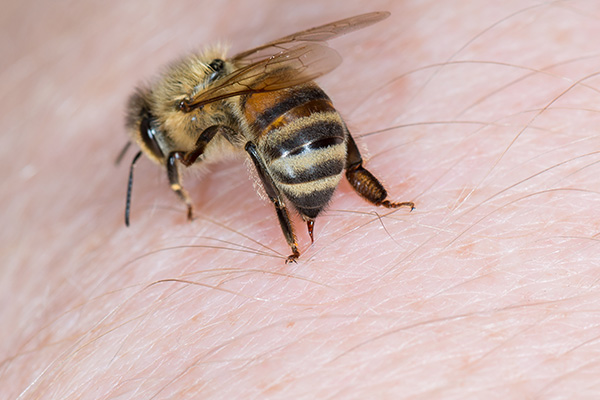Bee stings are tiny, so why do they hurt so much? There are a few reasons why. First, piercing your skin is never fun – it feels like getting a shot at the doctor’s office. The main reason, however, is what takes place afterward: bees deposit a small amount of venom into the sting. This venom can cause pain, irritation, and even severe allergic reactions in some.
That’s a basic explanation but there’s more to it than that. Let’s dive deeper and talk about everything you need to know about why bee stings hurt so much.
Why Does Bee Venom Hurt?
The scientific name for bee venom is “apitoxin”; it’s a complex mixture of protein substances that affect cellular function. The main active component in this substance is the peptide Melittin, consisting of 26 amino acids that destroy red blood cells. Not only that, but they activate pain receptors and contain anticoagulants that prevent the blood from clotting, which allows it to spread through the body faster and easier. Apitoxin by itself can cause immense discomfort, but when the mast cells die in response to it, cell death also triggers the release of histamine, and this can be quite painful too.
In other words, bee venom is a perfect recipe for causing pain in people. Fortunately, for most people, the pain is relatively short-lived and not serious. Most people will start feeling better with a little bit of time or over-the-counter pain reliever.
However, there are people who experience severe allergic reactions to bee stings. This is caused by too much histamine release, which results in blood vessels becoming too dilated. This can lead to anaphylactic shock, which can be deadly.
Need Bee, Wasp & Hornet Pest Control Services?
How to Make a Bee Sting Hurt Less
Experiencing a bee sting can be a painful and unsettling encounter. However, there are several simple measures you can take to alleviate the discomfort and promote quicker healing. By promptly addressing the sting and employing soothing remedies, you can mitigate the pain and irritation associated with bee stings:
- Remove the stinger as soon as possible by scraping it out with a fingernail or a blunt-edged object. Avoid squeezing or pinching the stinger, as this may release more venom.
- Wash the affected area with soap and water to reduce the risk of infection.
- Apply a cold compress or ice pack to the sting site to numb the area and reduce swelling.
- Consider using over-the-counter antihistamine creams or taking oral antihistamines to alleviate itching and inflammation.
- Monitor for signs of an allergic reaction such as difficulty breathing or swelling of the face and throat. Seek immediate medical attention if these symptoms occur.
Do Bees Die When They Sting?
Yes. Honey bees have a barbed stinger. These barbs make the stinger impossible for bees to remove. They have to detach themselves from the stinger, which results in their death.
How to Avoid Bee Stings
Regardless of whether or not you’re allergic to bees, it’s never fun to sustain a sting. Here are some precautions you can take to minimize the risk of a bee sting:
- Avoid wearing brightly colored clothing or floral patterns
- Steer clear of heavily scented perfumes, lotions, and hair products
- Be cautious when eating or drinking sweet substances outdoors, like soda
- Keep food and drinks covered when dining outdoors
- Stay calm and still if a bee approaches you, try not to swat or move quickly
- Be mindful of where you place your hands and feet when outdoors
- If you encounter a bee’s nest or hive, maintain a safe distance
- If you are allergic to bee stings, carry an epinephrine auto-injector with you
- Work with a professional bee removal company to avoid nests nearby
Avoid Bee Stings with Professional Bee Control
If you discover bees on your property, it’s crucial to handle the situation with care. Disturbing a nest can provoke defensive behavior from the bees and increase the risk of stings. It’s best to leave the removal of a bee’s nest to professionals.
If you need bee removal services, call us today for a quote!

